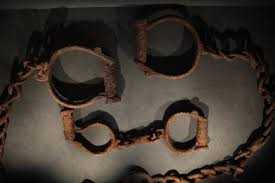
A public apology will be humbly given to the people of Grenada later this month by a UK family who feel deeply ashamed, after learning of their ancestors part in slavery on the Caribbean island during the 19th century.
The aristocratic Trevelyan family owned six sugar plantations in the early eighteen hundreds, and had more than 1,000 slaves under their control. Journalist Laura Trevelyan only discovered the shocking details of her family’s past when records of Britain’s Slave Compensation Commission were put online, and her relatives searched the database.
She and six others in her family, intend to donate £100,000 (approx $120,000) to the National Commission on Reparations for Slavery, who described the gesture as commendable. The commission was set up in 2021 following the BLM protests, after George Floyd’s murder.
Britain abolished African slavery in 1833, but has never formally apologised for it, or ever offered to pay reparations. In April last year Prince Edward the Earl of Wessex and his wife Sophie cancelled a visit to Grenada at the last minute, amid fears of demonstrations against slavery.
Grenada gained independence from the UK in 1974, so will celebrate its 50th anniversary this time next year.
Scenic setting hides dark secrets
The captivating Carenage, a horseshoe shaped inlet, in the heart of St Georges’s, one of the most attractive capitals in the Caribbean, is a bustling promenade winding round a busy marina with its colourful fishing boats, yachts, and barges full of supplies to be transported to and from the neighbouring islands.
It is a great place to stroll around and take in the wonderful scenery and enjoy the fabulous people of the community. It is almost impossible to imagine that this is the very same spot that up to almost two hundred years ago, was where the slave ships would dock, having arrived from West Africa, and the enslaved would emerge from their gruelling and bewildering journey, to be taken to auction and be sold on to the highest bidder, before being taken away to a punishing life of labour on the plantations.
The need for answers prompts documentary
Ms Trevelyan, is actually a BBC correspondent in New York, and had visited Grenada to make a documentary following her alarming findings of the Trevelyan family past. She had ascertained that her five-times great-grandmother Louisa Simon, had married Sir John Trevelyan in 1757, and had brought to the marriage her merchant father’s partnership in sugar cane plantations on the island of Grenada, and with it the “ownership” of approximately 1,000 slaves.
Trevelyan compensation claims valued in the millions as a present day equivalent
Seemingly, 46,000 compensation claims were made to the UK government when slavery was abolished back in 1833, with her own family it transpired, making a significant amount themselves, for which they were handsomely compensated.
One year later in 1834 Ms Trevelyan’s ancestors received a sum in the region of £34,000 for what was outrageously deemed to be the loss of their “property”, an incredibly offensive use of terminology, but one which probably very much reflected the attitudes of the time.
That figure is believed to be the equivalent of something like £3 million, were it be present day. Yet the freed African slaves received precisely nothing. The journalist said she simply could not ignore that sort of revelation, recognising that if anyone had “white privilege” then surely it was her.
A “ringing” endorsement of a shocking past
She was compelled to journey to the island and explained how she was taken to what is now bizarrely something of a tourist attraction, but also an education of the like, that many more should see.
A former slave plantation in the hills overlooking the island is geared up for visitors and a gift shop was selling artisan chocolate bars which were embossed with the image of a bell, but this was not any old bell, it was in fact a representation of a cast iron bell which hangs from a tree. It was the ringing of this bell that signalled the beginning of yet another working day for the slaves, relentlessly harvesting sugar cane for export.
Shocking cruelty beyond comprehension
Recalling the horrors which she was introduced to in the making of her programme, such as the devastating instruments of torture that would inflict terrible injuries – but were apparently justified by assertions of necessity for restraint – Ms Trevelyan admitted to feeling deep shame. A local novelist and descendent of slaves guided her through some artefacts from the national museum, including shackles, neck braces, and leather whips, many of which it is understood, were used on children.
She told of being shown a spot where metal rollers would have once been situated into which the cane would have been fed and crushed, but was horrified to learn that if a slave’s finger got caught in the roller, an official watching them toil away, would cut off the slave’s entire hand with a machete, to stop the slave body being pulled into the roller.
But this was not done with any good intentions, quite the contrary. Should a person become fully entangled that would have disrupted the production of the sugar, the individual slaves meant absolutely nothing to them other than an economic means.
Students welcome apology and financial gesture
Nicole Phillip-Dowe of the University of the West Indies and the Commission’s vice-chair, invited Ms Trevelyan into her office to interrogate official record books that included the Beausejour estate, where her ancestors owned slaves.
Educating the island’s youth about the history of slavery is a massive objective of the Reparations Commission, so Ms Phillip-Dowe introduced her to a some local students at a convent who were all descended from slaves, and each and every one of them felt that the UK should definitely pay reparations to the people of Grenada.
On a personal note, Ms Trevelyan stated that she wanted to contribute to an educational fund which students on the island could benefit from. The scholars that she met all acknowledged that this would be a demonstration of wanting to make amends for the past, as well as proof of caring about the future.
Example set?
It is, she said, important to recognise that crimes were committed and although she appreciated that her handing over £100,000, almost 200 years after the event probably seemed on the face of it, really inadequate, she hoped that by doing so she would be setting an example, by formally “apologising for what our ancestors did.”
Incredible cost of paying the owners
Paying off the slave owners did not come cheap back then, it is estimated that it cost the UK government a staggering £20 million back in 1834 to satisfy the slave owners, an enormous sum of money that actually represented 40% of their expenditure at the time.
Reparations argument rumbles on
The UK’s Foreign Office, whilst accepting that slavery was abhorrent, would not be drawn on the reparations argument which they say are complex. They did however say that the government “expressed deep regret that the transatlantic slave trade could ever have happened, and recognises the strong sense of injustice felt in countries affected by it around the world.”
Renamed in time for celebrations
Meanwhile, Grenada is moving on at pace. Their glorious landscape is still scarred with references to their colonial past. Many streets still bear the name of slave owning English, but with the 50th anniversary of the islands independence now less than a year away, the National Reparations Commission has recommended that by the time those celebrations take place, streets will have been renamed after prominent Grenadians.












0 Comments